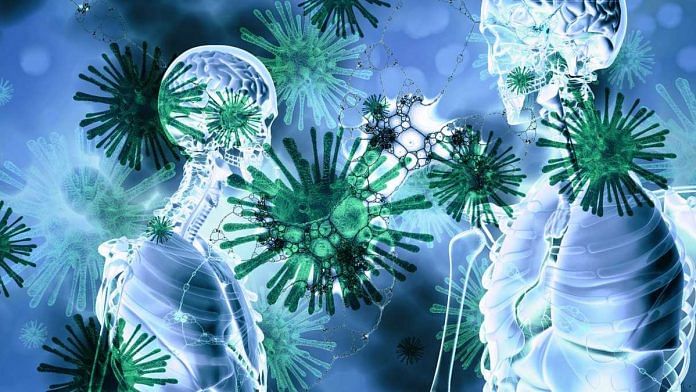New Delhi: A new study has discovered that immune cells in lungs could worsen a virus attack, a finding which could be significant in determining treatments for Covid-19 and other diseases.
Conducted by researchers at Karolinska Institutet in Sweden, the study showed how immune cells (also called macrophages) develop in lungs, and also identified which macrophages could be behind severe lung diseases.
Lead author of the study, Tim Willinger, associate professor at the Department of Medicine, Huddinge, Karolinska Institutet, said, “In our study, we show that classical monocytes (white blood cells) migrate into airways and lung tissue and are converted into macrophages that protect the health and function of the lungs.”
The study was published in Immunity on 30 December.
Also read: T cells more important than antibodies in body’s immune response to Covid, finds new study
Monocytes and macrophages
Monocytes and macrophages are both part of the human body’s immune system. A type of white blood cell, monocytes circulate in the blood for several days and convert to macrophages when they migrate into any tissue of the body.
Macrophages protect organs from viral and bacterial attacks. In case of lungs, the organs are exposed to viruses and bacteria from both air and the blood.
Monocytes are a type of white blood cell which surrounds and kills microorganisms, ingests foreign material and boosts immune response. There are two types of genetically different monocytes, which are ‘classical’ CD14+ monocytes and ‘non-classical’ CD16+ monocytes.
Study specs
The study found that under certain conditions, lung macrophages contribute to lung diseases such as chronic obstructive pulmonary disease and Covid-19.
Researchers used a model to study the development of macrophages in a living lung. In addition, they studied gene activity in individual macrphages, RNA sequencing and identified how monocytes become lung macrophages in humans.
They also discovered a new monocyte, called HLA-DRhi, which is an ‘intermediate’ immune cell present between a blood monocyte and an airway macrophage (the immune cells in the part of the lung that lets air in).
“These HLA-DRhi monocytes can leave the blood circulation and migrate into the lung tissue,” said Willinger.
The study suggested a ‘probable’ connection between certain macrophages and severe lung diseases.
Elza Evren, one of the authors of the study said, “In respiratory infections, for example, monocytes in the lungs develop into macrophages, which combat viruses and bacteria. But a certain type of macrophage may also contribute to severe inflammation and infections”
In the case of a Covid-19 infection, researchers said that protective, anti-inflammatory macrophages are ‘replaced’ by pro-inflammatory lung macrophages coming from blood monocytes.
Willinger explained that the existence of these macrophages derived from blood monocytes has been shown in studies which correlate Covid-19’s damage to lungs.
“Patients with severe Covid-19 also have fewer HLA-DRhi monocytes in their blood, probably because they move away from the blood into the lungs. Given their important role in rapid inflammatory responses, our results indicate that future treatments should focus on inflammatory macrophages and monocytes to reduce lung damage and mortality from severe Covid-19,” concluded Willinger.
Also read: The importance of Zinc in fight against Covid and what studies on the nutrient say






